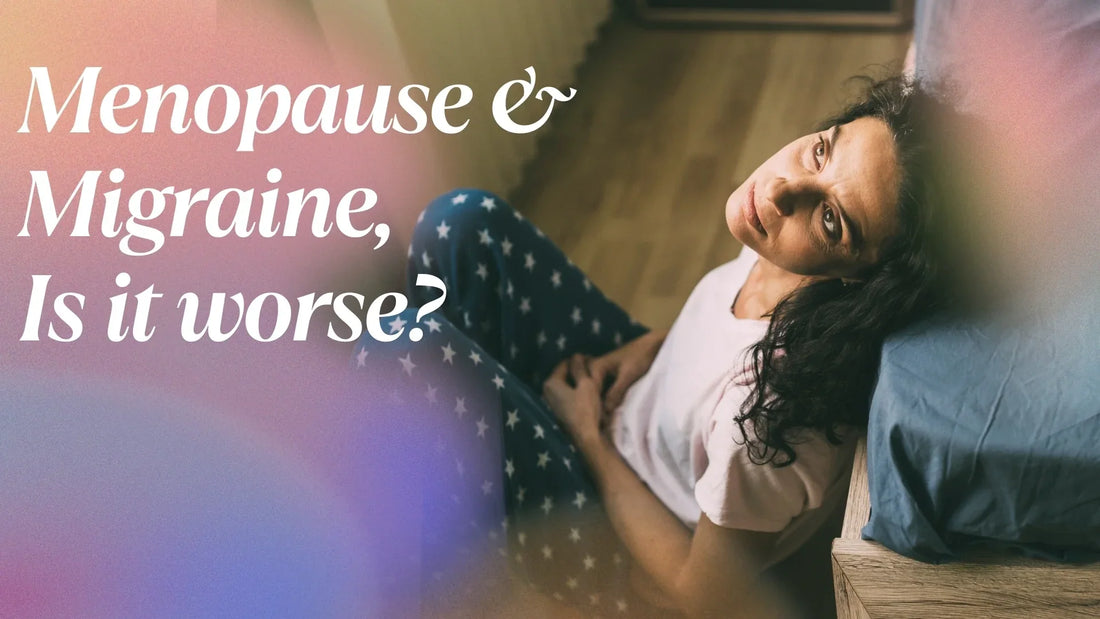
Menopause and Migraines: Everything You Need to Know
Share
For many women, menopause marks a significant transition, bringing both physical and emotional changes. While Hot Flushes and mood swings are often discussed, migraines during menopause deserve just as much attention. These headaches, often intense and debilitating, can take on various forms such as migraines with aura, ocular migraines, and vestibular migraines. Understanding the connection between menopause and migraines can help women manage this challenging phase more effectively.
Why Does Menopause Trigger Migraines?
Hormonal changes are the primary culprits when it comes to menopause-related migraines. Estrogen, a hormone that regulates many functions in a woman’s body, fluctuates significantly during perimenopause and menopause. For some, this hormonal rollercoaster can lead to migraines with aura, where visual disturbances like flashes of light or zigzag patterns occur before the headache.
Postmenopausal migraines, on the other hand, may continue due to the body's adaptation to a new hormonal baseline. Additionally, neck pain often accompanies menopause headaches, making daily life uncomfortable for many women.
Types of Menopause-Related Migraines
- Menopause and Migraine Headaches: These are typical migraines triggered by hormonal shifts, stress, or environmental factors. Women often report experiencing these headaches almost every day during perimenopause.
- Menopause and Vestibular Migraines: Vestibular migraines cause dizziness or vertigo along with a headache. These are particularly distressing as they can disrupt balance and coordination.
- Menopause and Ocular Migraines: Ocular migraines, common in perimenopause, cause temporary vision loss or visual disturbances in one eye. They are often linked to hormonal imbalances and can occur with or without headache pain.
- Silent Migraines and Menopause: Silent migraines are unique because they lack the headache but still include aura symptoms. They’re particularly confusing to diagnose but are just as disruptive.
What Do Menopause Headaches Feel Like?
Menopause headaches can range from mild throbbing to severe pain that feels like constant pressure on the temples or neck. Some women describe them as a pulsating sensation that can last for hours or even days. Neck pain often accompanies these headaches, making the discomfort more widespread.
What Causes Migraines After Menopause?
Even after menopause, migraines can persist due to lingering hormonal sensitivity. External factors like stress, diet, and lack of sleep can also act as triggers. For some women, these postmenopausal migraines become chronic, requiring careful lifestyle adjustments and medical attention.
Managing Menopause Migraines Naturally
- Track Triggers: Keep a journal to identify triggers like specific foods, stress, or poor sleep patterns. This can help in preventing frequent headaches.
- Stay Hydrated and Eat Balanced Meals: Dehydration and blood sugar fluctuations can exacerbate migraines. Incorporate nutrient-rich foods into your diet to help stabilize your body during menopause.
- Exercise Regularly: Gentle exercises like yoga or walking can improve blood circulation and reduce stress, which are common migraine triggers.
- Seek Medical Advice: If migraines become unmanageable, consult a healthcare provider. They may recommend hormone replacement therapy (HRT) or medications to alleviate symptoms.
Estrogen and Migraines with Aura
For women who experience migraines with aura, fluctuating estrogen levels can play a significant role. These migraines can be more frequent during perimenopause as estrogen levels rise and fall unpredictably. Postmenopause, when estrogen levels stabilize, some women may notice a decrease in these episodes, while others may continue to experience them.
Finding Relief
Dealing with menopause-related migraines can feel overwhelming, but knowing you're not alone can be comforting. Understanding the connection between hormonal changes and migraines can guide you in finding effective solutions, whether through lifestyle adjustments, natural remedies, or medical interventions.
Remember, every woman's menopause journey is unique, and migraines are just one part of the larger picture. Take time to care for your body and seek support when needed—you deserve it.





